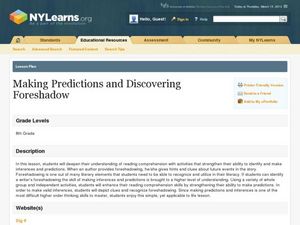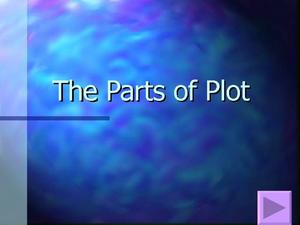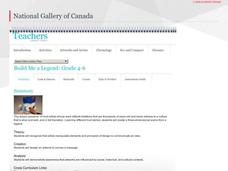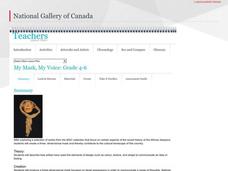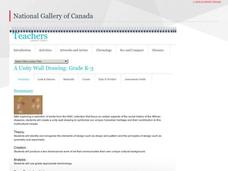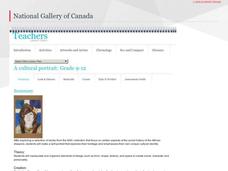Curated OER
Chemistry of Life Study Guide
Biology learners should understand a few chemistry basics. Here is a worksheet that introduces them to the concepts of chemical reactions, molecular bonding, and the unique combination of properties that make water vital to life....
Curated OER
Parts of the Plot: Constructing A Plot Diagram
After reading "The King of Mazy May" by Jack London, learners reinforce their literary analysis skills in this SMART board activity. The provided SMART board file allows themto define elements of a short story, and then add it to the...
Curated OER
Foreshadowing and Making Predictions
"What happens next?" Using real-life scenarios, movies, images, and other prompts, pupils practice making predictions based on inferences from clues. A SMART board activity takes them from making predictions to writing a prediction...
Curated OER
Story Pyramids
Young writers generate descriptive words. They use pictures of various landscapes (from books, magazines, or the Internet) and complete a story pyramid. The pyramid (included here) asks to describe the main character, the setting, and...
Curated OER
Parts of Plot
Questions are given on each slide of this presentation, asking learners to identify parts of plot. The questions have two answers per slide for readers to choose between, multiple-choice style. The last two slides are labeled "Great Job"...
Curated OER
Reading Comprehension: History of the Periodic Table
Although the article that launches this lesson is about the history of the Periodic Table, the objective is reading comprehension. Using the eight-page informational text, learners answer five comprehension questions and craft one essay....
EngageNY
Contrasting Two Settings (Chapter 6: "Lost Melones/Cantalouples")
Continue working through Esperanza Rising, by Pam Munoz Ryan, by looking into language choices and discussing text-dependent questions. Pupils converse in small groups and as a class about plot, setting, and figurative language. Using...
National Gallery of Canada
Social Realism
Examine social strife in art. Class members first observe some pieces, and then find an image to inspire their own art. They outline the picture, analyze the composition, make alterations, and color their work.
National Gallery of Canada
Me or You in the 30's?
Take on portrait painting and tertiary colors with a plan focused on recreating a photograph. After viewing several pieces of artwork, class members follow the instructions included here to create portraits or self-portraits in a...
National Gallery of Canada
Artful Emotions
Blue is sad, and red is angry, but why is that? Young artists explore the expression of emotions through art by observing and creating artwork. Starting with a questioning session about images of art, this plan moves into a sculpture...
National Gallery of Canada
Contemporary Reflections
Combine art and writing in a lesson about legends. After viewing Inuit art, class members examine their own cultural surroundings in order to write and visually represent a legend. Individuals are invited to take the creative reins when...
National Gallery of Canada
Build Me a Legend
Legends are full of imagery and action. Transfer a scene from a legend to a three-dimensional art piece. Class members first view Inuit art and discuss legends. They then build scenes that include action, setting, and characters.
National Gallery of Canada
My Mask, My Voice
Recognize Black History Month with an examination of the African diaspora and a hands-on mask-making project. Learners first view and discuss images of artwork before creating their own plaster masks.
National Gallery of Canada
Build a City of the Future!
Tap into your pupils' imagination by asking them to design futuristic, ideal cities. They must discuss and take scale and size into account, looking at some model pieces of art for inspiration and analysis. The final product for each...
National Gallery of Canada
A Unity Wall Drawing
Build class community with an art project. Learners first examine and discuss works of art. They then contribute to a class mural by tracing their hands and decorating them in relation to their own cultures. The final mural incorporates...
National Gallery of Canada
A Cultural Portrait
Explore heritage and identity through an examination of art and a related project. The featured art, related to the African diaspora, includes several types of art created by different artists. Pupils consider their own backgrounds and...
Curated OER
Running Out of Time: Concept Analysis
Tap into the information included in this in-depth analysis of Running Out of Time when planning your unit. The document includes a plot summary, analysis of the literary elements in the novel, implications for various student groups,...
E Reading Worksheets
Poetic Devices Finder
Track the poetic elements in any text with a guided reading worksheet. Kids note examples of consonance, alliteration, onomatopoeia, repetition, rhyme, and rhythm when reading a poem or story, and provide a short explanation as to why...
EdHelper
George Washington's Socks by Elvira Woodruff
A solid, straightforward book report form is an excellent addition to your literature unit. Class members note the main characters, point of view, plot elements, and other important details from a story, adding their favorite part from...
Laboratory for Atmospheric and Space Physics
Explore Saturn and Titan with Spectral Data
Titan is Saturn's largest moon and has its own atmosphere. An attention-grabbing tutorial allows learners to analyze the spectrum of Saturn and Titan to determine their elemental compositions. Scholars compare a known element's spectrum...
Beyond Benign
Cookie Equations
Cookies and chemical equations have a lot in common! Using cookies as a reference, scholars learn to balance chemical equations. Pieces of the cookies represent different parts of the compounds and elements. This is the sixth installment...
K20 LEARN
Periodic Shuffle: Introduction to Periodicity and Electron Configuration
No matter how you shuffle the elements, their electron configurations keep them in the same order. How can that be? Introduce the concept of periodicity through a lesson that combines inquiry, discussion, and comparison. Partners...
University of North Carolina
Poetry Explications
Explication may sound like a fancy word, but it's just a fancy way to say analysis. Using a handout on poetry explications, part of a larger series on specific writing assignments, writers learn how to break down and analyze a poem. The...
Literacy Design Collaborative
Author Study: Kate Chopin
Four stories by Kate Chopin offer high schoolers an opportunity to demonstrate their understanding of the ways authors use various literary elements and movements to develop their themes and social commentaries.
Other popular searches
- Story Elements
- Literary Elements
- Elements of Drama
- Elements of Art
- Elements of Poetry
- Periodic Table of Elements
- Narrative Elements
- Dance Elements
- Short Story Elements
- Elements of Design
- Fashion Design Elements
- Atoms and Elements




